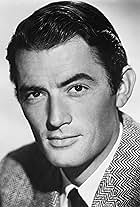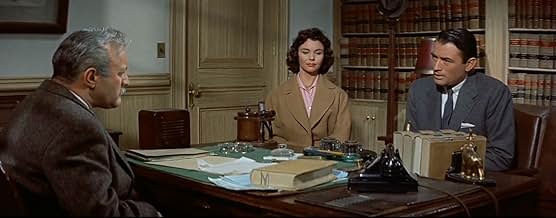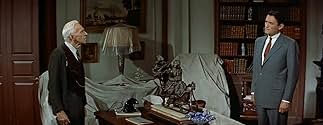Gregory Peck(1916-2003)
- Actor
- Producer
- Additional Crew
Eldred Gregory Peck was born on April 5, 1916 in La Jolla, California, to Bernice Mae (Ayres) and Gregory Pearl Peck, a chemist and druggist in San Diego. He had Irish (from his paternal grandmother), English, and some German, ancestry. His parents divorced when he was five years old. An only child, he was sent to live with his grandmother. He never felt he had a stable childhood. His fondest memories are of his grandmother taking him to the movies every week and of his dog, which followed him everywhere. He studied pre-med at UC-Berkeley and, while there, got bitten by the acting bug and decided to change the focus of his studies. He enrolled in the Neighborhood Playhouse in New York and debuted on Broadway after graduation. His debut was inEmlyn Williams' play "The Morning Star" (1942). By 1943, he was in Hollywood, where he debuted in the RKO filmDays of Glory (1944).
Stardom came with his next film,The Keys of the Kingdom (1944),for which he was nominated for an Academy Award. Peck's screen presence displayed the qualities for which he became well known. He was tall, rugged and heroic, with a basic decency that transcended his roles. He appeared inAlfred Hitchcock'sSpellbound (1945)as an amnesia victim accused of murder. InThe Yearling (1946),he was again nominated for an Academy Award and won the Golden Globe. He was especially effective in westerns and appeared in such varied fare asDavid O. Selznick's critically blastedDuel in the Sun (1946),the somewhat better receivedYellow Sky (1948)and the acclaimedThe Gunfighter (1950).He was nominated again for the Academy Award for his roles inGentleman's Agreement (1947),which dealt with anti-Semitism, andTwelve O'Clock High (1949),a story of high-level stress in an Air Force bomber unit in World War II.
With a string of hits to his credit, Peck made the decision to only work in films that interested him. He continued to appear as the heroic, larger-than-life figures in such films asCaptain Horatio Hornblower R.N. (1951)andMoby Dick (1956).He worked withAudrey Hepburnin her debut film,Roman Holiday (1953).Peck finally won the Oscar, after four nominations, for his performance as lawyer Atticus Finch inTo Kill a Mockingbird (1962).In the early 1960s, he appeared in two darker films than he usually made,Cape Fear (1962)andCaptain Newman, M.D. (1963),which dealt with the way people live. He also gave a powerful performance as Captain Keith Mallory inThe Guns of Navarone (1961),one of the biggest box-office hits of that year.
In the early 1970s, he produced two films,The Trial of the Catonsville Nine (1972)andThe Dove (1974),when his film career stalled. He made a comeback playing, somewhat woodenly, Robert Thorn in the horror filmThe Omen (1976).After that, he returned to the bigger-than-life roles he was best known for, such asMacArthur (1977)and the monstrous Nazi Dr. Josef Mengele in the huge hitThe Boys from Brazil (1978).In the 1980s, he moved into television with the miniseriesThe Blue and the Gray (1982)andThe Scarlet and the Black (1983).In 1991, he appeared in the remake of his 1962 film, playing a different role, inMartin Scorsese'sCape Fear (1991).He was also cast as the progressive-thinking owner of a wire and cable business inOther People's Money (1991).
In 1967, Peck received the Academy'sJean HersholtHumanitarian Award. He was also been awarded the US Presidential Medal of Freedom. Always politically progressive, he was active in such causes as anti-war protests, workers' rights and civil rights. In 2003, his Peck's portrayal of Atticus Finch was named the greatest film hero of the past 100 years by the American Film Institute. Gregory Peck died at age 87 on June 12, 2003 in Los Angeles, California.
Stardom came with his next film,The Keys of the Kingdom (1944),for which he was nominated for an Academy Award. Peck's screen presence displayed the qualities for which he became well known. He was tall, rugged and heroic, with a basic decency that transcended his roles. He appeared inAlfred Hitchcock'sSpellbound (1945)as an amnesia victim accused of murder. InThe Yearling (1946),he was again nominated for an Academy Award and won the Golden Globe. He was especially effective in westerns and appeared in such varied fare asDavid O. Selznick's critically blastedDuel in the Sun (1946),the somewhat better receivedYellow Sky (1948)and the acclaimedThe Gunfighter (1950).He was nominated again for the Academy Award for his roles inGentleman's Agreement (1947),which dealt with anti-Semitism, andTwelve O'Clock High (1949),a story of high-level stress in an Air Force bomber unit in World War II.
With a string of hits to his credit, Peck made the decision to only work in films that interested him. He continued to appear as the heroic, larger-than-life figures in such films asCaptain Horatio Hornblower R.N. (1951)andMoby Dick (1956).He worked withAudrey Hepburnin her debut film,Roman Holiday (1953).Peck finally won the Oscar, after four nominations, for his performance as lawyer Atticus Finch inTo Kill a Mockingbird (1962).In the early 1960s, he appeared in two darker films than he usually made,Cape Fear (1962)andCaptain Newman, M.D. (1963),which dealt with the way people live. He also gave a powerful performance as Captain Keith Mallory inThe Guns of Navarone (1961),one of the biggest box-office hits of that year.
In the early 1970s, he produced two films,The Trial of the Catonsville Nine (1972)andThe Dove (1974),when his film career stalled. He made a comeback playing, somewhat woodenly, Robert Thorn in the horror filmThe Omen (1976).After that, he returned to the bigger-than-life roles he was best known for, such asMacArthur (1977)and the monstrous Nazi Dr. Josef Mengele in the huge hitThe Boys from Brazil (1978).In the 1980s, he moved into television with the miniseriesThe Blue and the Gray (1982)andThe Scarlet and the Black (1983).In 1991, he appeared in the remake of his 1962 film, playing a different role, inMartin Scorsese'sCape Fear (1991).He was also cast as the progressive-thinking owner of a wire and cable business inOther People's Money (1991).
In 1967, Peck received the Academy'sJean HersholtHumanitarian Award. He was also been awarded the US Presidential Medal of Freedom. Always politically progressive, he was active in such causes as anti-war protests, workers' rights and civil rights. In 2003, his Peck's portrayal of Atticus Finch was named the greatest film hero of the past 100 years by the American Film Institute. Gregory Peck died at age 87 on June 12, 2003 in Los Angeles, California.







































